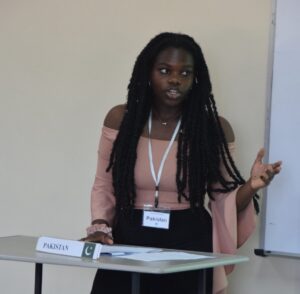By Johnny Schwerk
Model United Nations (MUN) conferences are a simulation of the United Nations, where students are assigned countries and committees while learning how to debate issues of global importance from a variety of perspectives. Aside from the development of important skills (research, policy-writing, public speaking, collaboration, diplomacy and conflict resolution), students also get the unique opportunity to engage with real-world situations, seeking sustainable and feasible solutions that could make a difference in real people’s lives. But perhaps most importantly, MUN provides students with the chance to meet, engage and work together with students from various backgrounds and value systems.
Not just for athletes
Many schools have extensive programmes for students to participate in sports activities, sometimes involving international travel to distant locations. But what about all those students who yearn for such a travel experience but may not be athletically inclined? This is a common challenge in many international schools: how do we provide travel opportunities for students who do not like participating in sports? The West African International Schools Activities League (WAISAL) has a long and rich history of sports events that attract international school students from across West Africa. But it was high time for there to be a different type of event that appeals to the intellectual, and academic types who may or may not also be involved with sports.
The inaugural conference
In March 2023, Lincoln Community School (Ghana) hosted the inaugural WAISAL MUN conference. This was the first large-scale, non-sports event hosted by WAISAL, featuring 150 students from 10 schools across the region. Significantly, the conference was largely student-run: The four committees (Security Council, ECOSOC, Human Rights Council and Disarmament Committee) were chaired by students; the Secretariat that played a key role in the logistics of the conference was made up of elected students; and there was a student-run Press Corps, which published a daily “newspaper” that featured events surrounding the conference. This gave a wide variety of students the chance to participate in a meaningful way in the event, both in the run-up to the conference and during the conference itself.
The WAISAL MUN Conference’s Opening Ceremony’s keynote speaker was the Israeli ambassador to Ghana, Liberia and Sierra Leone, Her Excellency Shlomit Sufa; and Senior Durable Solutions Officer from the UN Refugee Agency, Andrew Ginsberg, addressed the Human Rights Council. The theme of the conference was based on UN Sustainable Development Goal 5 ‘Achieve gender equality and empower all women and girls’ and the resolutions passed by the Human Rights Council were submitted to the UNHCR’s MUN Refugee Challenge. On the second night, a social event was hosted at the school where students congregated in the multipurpose hall to listen to music, socialize, shoot some hoops, or kick a ball around.
At the WAISAL MUN conference in March 2023, half of the attending schools came from within Ghana (some of whom had never participated in MUN before) and the other half came from across West Africa, ranging from Cameroon to Senegal. The personal friendships forged at the conference created lasting memories and the skills the students developed in those three days continue to be invaluable to the students’ continued academic and social success. Once a MUN culture has been established at a school, the older students naturally morph into becoming mentors and role models for the younger delegates, making the teacher’s role much less central to the success of the programme as a whole. This also gives the students increased ownership and pride in the MUN programme, and the school-hosted conference in particular.

Photo: Lincoln Community School student
“The skills the students developed in those three days continue to be invaluable to the students’ continued academic and social success.”
Tips for success and sustainability
While 2023 marked the first year for a WAISAL MUN conference, it was just the beginning of what will hopefully be a storied tradition of MUN conferences for WAISAL member schools. In April 2024, the American International School of Lagos hosted the second conference, and the third conference is scheduled for next school year at the International Community School of Abidjan (Côte d’Ivoire). There are several keys to making an international MUN conference both successful and sustainable, some of which are listed below.
- Regional organisation: It helps to have a regional school organisation in place already because it is easier to tap into existing travel and housing structures. The West African International Schools Activities League (WAISAL) is such an organisation but most international schools are already members of similar regional activities leagues.
- Chair and delegate preparation: It is imperative that all participants are well prepared ahead of time because the quality of the debate is directly dependent on this level of preparation. Chairs must be intimately familiar with debate procedures; delegates must know their assigned country’s position on the committee topics; who their allies and adversaries are on the global political stage; and how to prepare and deliver speeches that will convince their fellow delegates to vote with them.
- Chair reports: The student chairs of each committee publish a so-called Chair Report well ahead of the conference, which provides background information and resources about each of the committee topics being debated. This helps to frame the debate and facilitates a basic level of delegate preparedness, which raises the overall quality of debate.
- Committee size: MUN conferences have varying committee sizes and there are advantages and disadvantages to each. If a committee is too large, it may make it difficult for all delegates to actively participate because of time limitations. If a committee is too small, then debate may not be as fruitful because there may be a limited diversity of perspectives.
- Collaboration, not competition: Unlike sports events, MUN conferences, by definition, are marked by collaboration and cooperation. Yes, there may be struggles between countries over influencing others’ perspectives, but the end goal is always to find mutually agreed upon solutions to the world’s most pressing issues, which can only be achieved by working together towards a common end. The aim of MUN is to help students – as the IB Mission says so eloquently – “…understand that other people, with their differences, can also be right.” A life skill indeed.

Johnny is a counsellor at the Lincoln Community School in Accra, Ghana. He has directed MUN programs for over 20 years including 9 years in Ghana. You can contact him via email.



